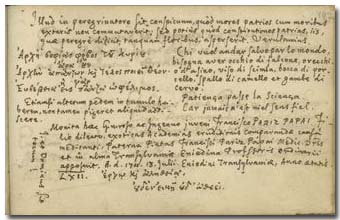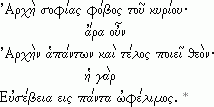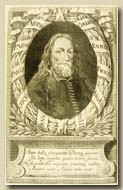
Illud in peregrinatore sit conspicuum, quòd mores patrios cum
moribus exteris non commutaverit; sed potiùs quòd constitutiones
patrias, iis, quae peregrè didicit, tanquam floribus, asperserit.
Verulamius. *

Etiamsi alterum pedem in tumulo haberem, non tamen pigeret aliquid
addiscere.
Chi vuol andar salvo par lo mondo, bisogna aver occhio di falcone,
orecchio d’asino, viso di scimia, bocca di porcello, spallo di
camello et gambe di cervo.
Patiença passe la sciença.
Car jamais n’est miel sens fiel.
Monita haec Generoso ac Ingenuo juveni Francisco PARIZ PAPAI Filio
dilecto, exoticas Academias eruditionis comparandae causâ
meditandi, Paterna Pietas Francisci Pariz Pápai Medic. D[octo]ri
et in alma Transylvaniae Eniedina Professoris ordinarii apposuit,
A. d. 1711. 13. Julii. Eniedini Transylvaniae, Anno aetatis LXII.

I, et Dominus sit tecum!
|
* Francis Bacon, Sermones Fideles
sive Interiora Rerum, 1638, ch. 28. *
The first line is Ps 111:10: “The fear of the Lord is the
beginning of wisdom”.
Vulgate: “initium sapientiae timor Domini”. The other lines
have no biblical correspondent.
* The first half of this verse is from 1Jn 3:18: “in deed and
in truth”;
Vulgate: “opere et veritate”.
|
|
|
|
A student on peregrination should take care not to mix up his
native customs with those of the countries visited, but rather to
ornate, as it were with flowers, those brought from home with
those learned abroad. [Francis Bacon, Lord] Verulam. *
The fear of the Lord is the beginning of
wisdom, *
for
the beginning and the end of all things is created by the Lord,
so that
the fear of God is useful in everything.
Even if I were with one leg in the tomb, I
would not be lazy to learn something new.
Whoever wants to go safely in the
world, should have the eyes of a hawk, the ears of an ass, the
face of a monkey, the mouth of a pig, the shoulders of a camel,
and the legs of a deer.
Patience yields science, / for
there is no honey without gall.
These admonitions were put down
for the noble and eminent young Ferenc PÁPAI PÁRIZ, my dear son
who is going to set out to foreign academies for increasing his
knowledge, by the fatherly love of the physician Ferenc Pápai
Páriz, ordinary professor in the illustrious town of the
Transylvanian Nagyenyed. In the year of the Lord 1711, on July 13,
in the Transylvanian Nagyenyed, in the 62th year of his life.
In deed and in truth;
* never in vanity, turning away from God.
Go, and may the Lord be with you!
|
p.
447. Nagyenyed (Aiud), July 13, 1711
 Pápai Páriz, Ferenc,
Sen. Pápai Páriz, Ferenc,
Sen.
(1649-1716), Transylvanian
physician, professor and author
Ferenc Pápai Páriz (F. Páriz-Pápai) was born on
May 10, 1649 in Dés (Szolnok-Doboka county, today Dej), the son of
the Reformed pastor and archdeacon Imre P. P (1618-1667), and of
Krisztina Kávási (?-1663). He learned in Dés, and from 1656 – when
his father became the court pastor of Prince György II. Rákóczy –
in Gyulafehérvár (Alba Iulia), then in Kolozsvár (Cluj) and
Marosvásárhely (Târgu Mureş). After the loss of his parents, his
relatives continued to support his studies. From 1667 he studied
in the Bethlen College of Nagyenyed (Aiud) with excellent
professors, where he also held some offices. In 1672 he went to
study abroad. After Breslau (Wroc³aw) he read medicine in Leipzig,
then he visited Frankfurt an der Oder, Marburg and Heidelberg.
Here he graduated in philosophy, but refused the teaching position
offered to him, as he did not feel worthy of it. From April 1673
he studied in Basel, where he graduated in medicine in October
1674, and he was also awarded the title of “assessor of the chair
of medicine in Basel”. He made close friendship with a number of
renowned professors and other learned Swiss physicians and
theologians, among others with the philologist Johann Jakob
Hofmann (1635-1706) and the orientalist Johann Heinrich Hottinger
(1647-1692). In 1675 he returned home. He was invited as a
physician to Debrecen and to Kolozsvár, but he refused to go. From
1677 he was court physician of Anna Bornemissza, wife of Prince
Mihály I. Apafi, and from 1688 physician of the Prince himself. In
1678 he was elected professor of the College of Nagyenyed, and he
kept this position until his death. He taught philosophy, Greek
language and natural sciences, besides continuing his medical
practice. He did much for the college, by procuring support for
students going abroad, and by collecting donations through his
good foreign connections for the rebuilding of the college after
the devastation of the college and of the town in 1704 and 1707.
He was in connection with Daniel Ernst Jablonski (1660-1741) not
only concerning stipends in Frankfurt an der Oder, but also in
relation to the compilation of the history of Hungarian
Protestantism. In 1676 he married Kata Zöldi (?-1685) in Debrecen.
After the death of his wife in 1686 he married Anna Szeghalmi
(Székhalmi, ?-1691), in Torda (Turda), and after her death Judit
Nyirő (?-1710). His son Imre (1693-1730) became professor in
Nagyenyed, András (1703-1763) and Ferenc (1687-1740) physicians.
He sent his son Ferenc together with András Ajtai Szabó abroad,
especially to England, to collect donations for the college. He
died on September 10, 1716 in Nagyenyed. He was renowned and
highly esteemed already in his lifetime. His views were influenced
by Puritanism and Cocceianism. Besides his practical activity, he
composed an enormous literary and scientific oeuvre. His books,
translations, adaptations, and especially his Latin-Hungarian
dictionary were published several times and used by many
generations. (The authoritative dictionary of Hungarian literature
by József Szinnyei lists his works in more than three columns.) He
revised and enlarged the Latin-Hungarian and Hungarian-Latin
dictionaries of Albert Szenci Molnár; his edition was published
with laudatory poems by his sons, and with an appendix on
Hungarian orthography by János Csécsi, Sen., an assistant of the
renowned typographer Miklós Misztótfalusi Kis. He also wrote a
funeral poem on the death of Misztótfalusi, in which he offered a
survey of typography. His Pax corporis was the first work
on medicine written in Hungarian. Some of his better known works:
Pax animae, az az a' lélek bekessegeről, és az elme
gyönyörüsegeröl való tracta …, Kolozsvár, 1680. – Pax
corporis, az az az emberi testnek belső nyavalyáinak okairól,
fészkeiről 's azoknak orvoslásának módgyáról való tracta …,
Kolozsvár, 1690. 2nd ed. Lőcse, 1692, etc. Modern edition:
Budapest, 1984, ed. by Ferenc Szablyár. – Pax Aulae, az-az
Bölts Salomon egynehány válogatott reguláinak rövideden való
elő-adása …, Kolozsvár, 1696. – Pax sepulchri, az az,
idvességes és igen szükséges elmélkedés arról, miképen kellessék
embernek mind keresztyénül élni, mind pedig idvességesen meghalni
…, Kolozsvár, 1698. – Életnek könyve, melybe béíratott példás
emlékezetre méltó neve a nemzetes, tiszteletes, tudós M. Tótfalusi
Kis Miklós uramnak, 1702. No surviving copy of this latter
work is known; its later editions follow the version included in Bod, Péter: Erdélyi Féniks, 1767
[e.g. Jakó 409-416]. – Dictionarium
Latino-Hungaricum …, Lőcse, 1708. (and several other
editions).
The father provides his beloved son with touching
words, valuable advices, and adhortations in Latin, Greek, Italian
and Provençal on his long way. –
In the album of Ferenc Pápai Páriz, Jun. we also find mementos by
some old friends of his father, thus the brother of the Swiss
theologian Johann Heinrich Hottinger, Johann Jakob H., as well as Daniel Ernst Jablonski
and his son Paul Ernst J. from Berlin (pp. 215,
121,
361). The son of János Csécsi and András Ajtai
Szabó made their notes in the album as well (pp.
352,
451). – Here we note that the
Latin-Hungarian Dictionarium of Ferenc Pápai Páriz proved
highly useful to us both in the analysis of this album, and of
other contemporary Latin texts, as it reflects not only classical
Latin, but also the Latin usage of contemporary Hungary and
Transylvania. – As various lexicons give different data relating
to the family of Ferenc Pápai Páriz, here we list the names of his
wives and adult children, on the basis of the most detailed
biography by Makkai: 1. Katalin Zöldi; their daughter Anna
Borbála, later wife of István Weszprémi; 2. Anna Szeghalmi; their
children Ferenc and Krisztina, later wife of Péter Nádudvari; 3.
Judit Nyirő, their sons Imre and András.
•
BritHung • Jöcher-Adelung • Makkai • MÉL • MNL • Szinnyei X 400 •
ÚMIL • Weszprémi I 248 • Zoványi-Ladányi |

